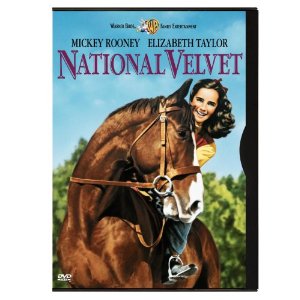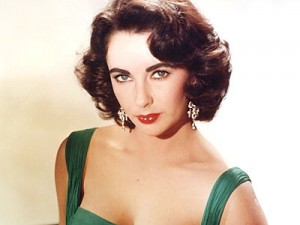In memory of Elizabeth Taylor, this week’s DVD pick has the performance that made her a star, along with Anne Revere, who won an Oscar for her role as Elizabeth Taylor’s mother in “National Velvet.”
Mi Taylor (Mickey Rooney) arrives in a small English town and meets Velvet (Elizabeth Taylor) just as she and her sisters have been let out of school for the summer. They like each other immediately, and she is delighted to learn that the reason he has come to her town is that he found her mother’s name in the address book belonging to his late father. He does not know what their relationship was, or what he hopes to find from her, but he has no other place to go.
At the dinner, Mi is tentative, not sure himself whether he is looking for a friend or an easy mark. That night, as Mrs. Brown goes over that day’s books and puts away the cash from their butcher shop, she and Mr. Brown talk about giving Mi a job. Mr. Brown is reluctant, saying they don’t need him, and that he seems to have a “sharpness” about him, but she insists. After Velvet tells him he is going to stay, he sneaks back into the house to return their money, which he had stolen.

Even though she wins the race, Velvet is deprived of the title and the prize because girls are not eligible to race. No one questions that rule or seems surprised by it; she undertakes the race knowing that this will happen. Mr. and Mrs. Brown are equal partners at home and at work, though she is the stronger character.
The horse Velvet loves most is owned by a man who, angry and frustrated at his inability to control it, decides to sell it by lottery. Velvet wins and renames the horse Pi. He won’t pull the butcher shop cart, but he can jump a fence as high as the most treacherous hazard in England’s biggest horse race, the Grand National. So Velvet decides that he must be in that race, to have a chance to be the very best he can be, the very best there is.
They hire a jockey by mail, but Velvet knows the horse must be ridden by someone who loves him, and would rather not have him race at all than have a jockey who does not believe he can win. Just as Mi is about to volunteer, Velvet decides that she will ride the Pi, even if they could have had the best jockey in the world, even if they will get in trouble because girls are not allowed to race. She rides the Pi, and he wins. But they are both disqualified because she is a girl.
They come back home in triumph, knowing that they won what was important to them. Though they were not allowed to keep the title or the prize money, all charges have been dropped, and they won’t get into trouble for violating the rules. Mr. Brown is excited by all of the offers for appearances and endorsements, but Velvet knows that it would not be best for the Pi and that it is time to move on. So does Mi, who takes his knapsack and says good-bye to Mr. and Mrs. Brown. When Velvet hears that he has left, she asks if she can tell him about his father, who was Mrs. Brown’s coach, and how much he meant to her in achieving her dream. Mrs. Brown consents, and Velvet races after him, just catching up to him as the movie ends.
“National Velvet” taps into one of the oldest, deepest dreams, the dream of horses. Every child dreams of controlling these huge, powerful, loyal creatures, of flying over hurdles on their backs, of earning their devotion and of being devoted to them in return. And then there is the dream of racing, as Velvet says in this movie, until you burst your heart, and then until you burst it again, and then until you burst it twice as much as before, until the two of you explode past the finish line ahead of everyone else.
This is the story of dreams themselves, wise and foolish, big and small, realized and impossible, and about the way all of these dreams change those who are lucky enough to dream them. It is about the importance of faith — Velvet’s faith in herself and in the Pi and in her dream, and her family’s faith in her and in Mi — and the importance of that belief and support in making the dream come true. Mi says, “You bit off a big piece of dream for yourself, Velvet.” But in one of the sweetest scenes ever filmed, Mrs. Brown takes out the 100 gold pieces she won for swimming the Channel, and gives them to Velvet. There were a thousand times the family could have used that money, but she was saving it for a dream as big as her own once was. She tells Velvet, “I too believe that everyone should have a chance at a breathtaking piece of folly once in his life.”
“National Velvet” is also a rare movie that deals with what happens after the dream comes true. It sometimes seems that half the movies that are made, and well over half of the movies that are made for children, end with the hero or heroine triumphantly standing in the winner’s circle, holding the trophy overhead as the music swells and the credits roll. One of the things I like best about this movie is that it puts the dream in perspective. After they win the race, Mr. Brown is delighted with all of the offers for appearances and endorsements for Velvet and her horse. Instead of arguing with him, Mrs. Brown asks Velvet how she feels about it. Velvet thinks it might be fun for her, but says that she would never put the Pi through all of the foolishness that would be required. Velvet and her friend Mi and those around them take what they have learned from the dream and go on with their lives, something worth discussing in this era when any achievement, good or bad, becomes a miniseries.
But most of all, “National Velvet” is the story of a loving family. It is very different in many ways from the families that the American children of today know — for example, the mother and father are so reserved that they call each other “Mr. and Mrs. Brown” until the very last scene. But it is a wonderful starting point for a discussion of the ways that families of all kinds can teach and support each other.
One of the key themes of the movie is the faith that the characters have (and don’t have) in themselves and in each other. Mr. Brown is reluctant to accept Mi at first, with good reason. As Mrs. Brown says, it would be surprising for someone who had lived on the streets not to have a “sharpness about him.” But, she persuades Mr. Brown to give him a chance: “What’s the meaning of goodness if there isn’t a little badness to overcome?” Mi does steal their money, but when he learns of their faith in him, their offer of a job and a place to stay and Velvet’s acceptance of him as a friend, he puts it back. Later, when he has a chance to steal much more money from the family, he thinks about it, but decides that he can’t, because “she trusts me.”
Velvet’s faith in both Mi and the Pi is at the center of the movie. She accepts them both immediately and irrevocably, though both are mistrusted by others. She does not believe Mi when he says he doesn’t like horses, and when he says he is only interested in the race for the money. She knows that he feels as passionately for the Pi as she does, though he cannot say it.
Velvet also has faith in the future. She is certain that she will win the lottery for the horse she loves. When she tells everyone she will win, a suspicious neighbor suggests that she may have cheated by arranging for her father to pick her number in the drawing. She explains that she didn’t bother with that, she just worked it out with God. Mr. Brown responds to the neighbor’s accusation by having him do the drawing, and of course Velvet does win (after there is no holder of the first number picked). When the jockey they have hired by mail to ride the Pi in the race shows them that he not only does not believe that the Pi can win, he does not even care, Velvet knows that it would be wrong to let him ride her horse. Just like Mi and Velvet herself, the Pi deserves someone who believes in him.
Mr. and Mrs. Brown show their trust by risking letting Mi and their children make mistakes. “She has it in her to do the right thing,” Mrs. Brown says of Velvet, and lets her decide how to respond to the offers that come in after she wins the race. Mrs. Brown also lets Velvet run to school after being up all night caring for the horse. When Mr. Brown objects, she reassures him that Velvet will be back — it’s Saturday, and there is no school. But she let her go because “I like that part of her that wants to go to school after a night caring for the horse.” Mrs. Brown not only lets Mi stay with the family, but she entrusts him to take her 100 gold pieces to London. Mr. Brown is certain he will steal it instead. But as the train pulls away, you can see Velvet reflected in the window of the train car. This symbolizes the way that the image of Velvet, and her faith in him, stays with Mi, and prevents him from taking the advice of his friends who get him drunk and encourage him to steal the money. As they leave for the race, Velvet says to Mrs. Brown, “You’ll be proud of the Pi, mother.” Mrs. Brown says, “I want to be proud of you.” And she is.
Throughout the movie, Mr. and Mrs. Brown balance a spacious acceptance of their children’s passions with a firm set of values and a fairly strict set of rules. Velvet is permitted to pretend to ride in bed only one night a week, and only for 15 minutes. At his first dinner with the family, Mi is reprimanded sharply by Mr. Brown (Donald Crisp) for feeding the dog at the table (“It will turn him into a beggar,” a pointed comment to the young man who has arrived at their door and may have some hope of being helped). But as we see during the course of the scene, each member of the family, including Mr. Brown, sneaks food to the dog when the others aren’t looking. Similarly, Velvet is constantly reminded by everyone to wear her braces. When Mi does this, on the way to the race, it shows how much he has accepted the family’s set of priorities and the responsibility of caring for its members. In this case, though, he lets her take the braces out until the race is over. Like Mr. and Mrs. Brown, he knows when to suspend the rules. Mrs. Brown won’t tell Mi how much his father meant to her until he leaves them. As long as he had no faith in himself, that information would be no more than a way to get something from the Brown family. But once he no longer felt “soft and yellow inside” he could accept it as a heritage to build on.
(more…)







